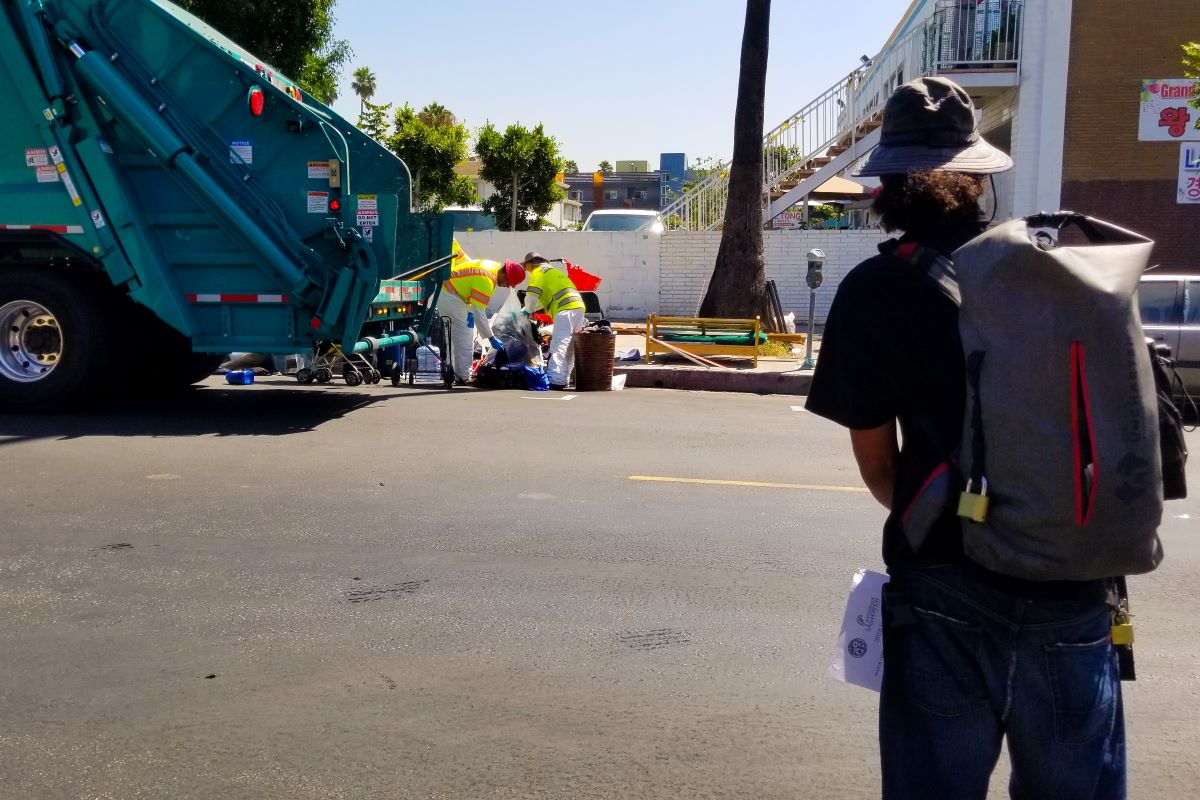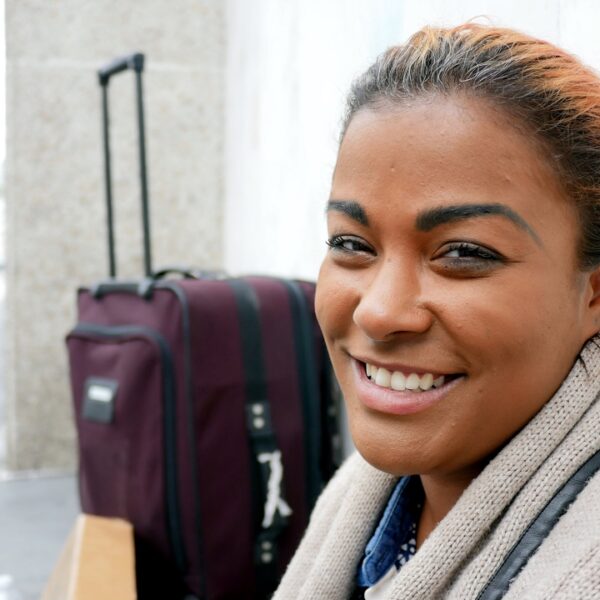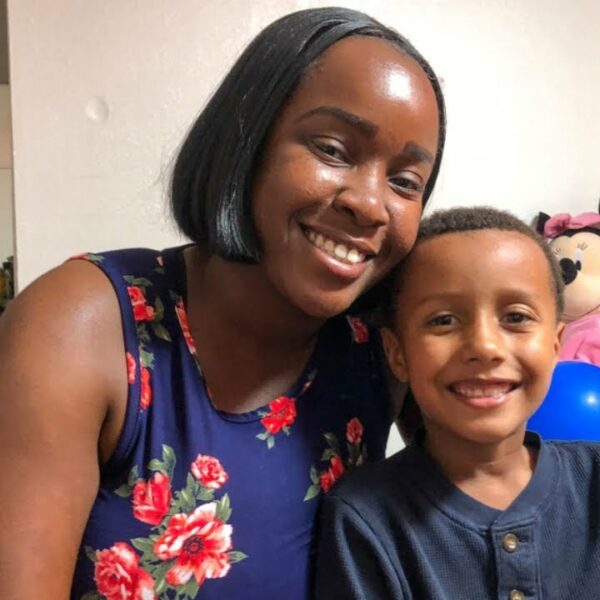K-Town For All Joins Unhoused Plaintiffs in Challenge Against Sanitation Sweeps
On a grey, mid-summer morning in July, seven homeless plaintiffs and two community organizations including K-Town For All, filed a lawsuit against the City of Los Angeles. The civil complaint, announced at a press conference on July 18 by the Legal Aid Foundation of Los Angeles, challenges the constitutionality of municipal code 56.11, which prohibits the storage of personal property in public areas.
“I can’t get out of the hole I’m in because they keep putting me back to square one.” Janet Garcia, a houseless resident of Van Nuys, looked like she was fighting tears when she spoke briefly at last month’s press conference. “It’s not fair for us that are trying to get out of this.” Garcia was pushed out of an apartment and onto the streets two and a half years ago. She currently lives down the street from her old place.
Garcia is one of seven unhoused plaintiffs that claim to have lost laptops, birth certificates, social security cards, tents, blankets, dog kennels, medicine and other useful property during sanitation sweeps. The lawsuit paints an honest picture of what it’s like to live on the streets of Los Angeles.
“I work…I do house cleaning and office cleaning.” Garcia explains. According to the lawsuit, Garcia has been a victim of multiple unlawful sanitation sweeps and in the process, the cleaning supplies that she uses for work have been confiscated and destroyed. “I always have to restart over because they come and they sweep and they take everything from me.”
Replenishing her supplies is timely as well as costly. In addition to losing resources that will help Garcia get off the streets, she’s lost personal belongings too, including pictures of her kids.
Constant seizure and destruction of homeless people’s property perpetuates the cycle of being homeless and frankly wastes money.
K-Town For All, a Koreatown based homeless outreach network, is one of two advocacy groups represented in the lawsuit. The organization was formed in response to protests against the original bridge housing plan in Koreatown in 2018. (The location of the shelter was later moved to the edge of Koreatown near Lafayette Park.) Since then, the group has passed out hundreds of dollars’ worth of supplies to the homeless, helped people secure housing and others fight evictions.
“We don’t want to sue the city of L.A” said K-Town For All organizer, Mike Dickerson during last month’s press conference. “However, the city council has repeatedly demonstrated that they won’t address the root cause of L.A.M.C 56.11”
In June, the city announced some changes to its sanitation program, but they did not address the unconstitutional issues with 56.11. Instead the city gave more money to the LAPD and made it clear that they would continue to enforce the ordinance.
Through their weekly outreach, the group noticed how sanitation sweeps negatively impacted the people they were trying to help. One week volunteers would pass out tents and supplies and the next week they would find out that the supplies were confiscated and destroyed in a sweep. K-Town For All has reallocated hundreds of dollars that would otherwise be spent on advocacy and outreach to replace their homeless neighbor’s tents and other belongings.
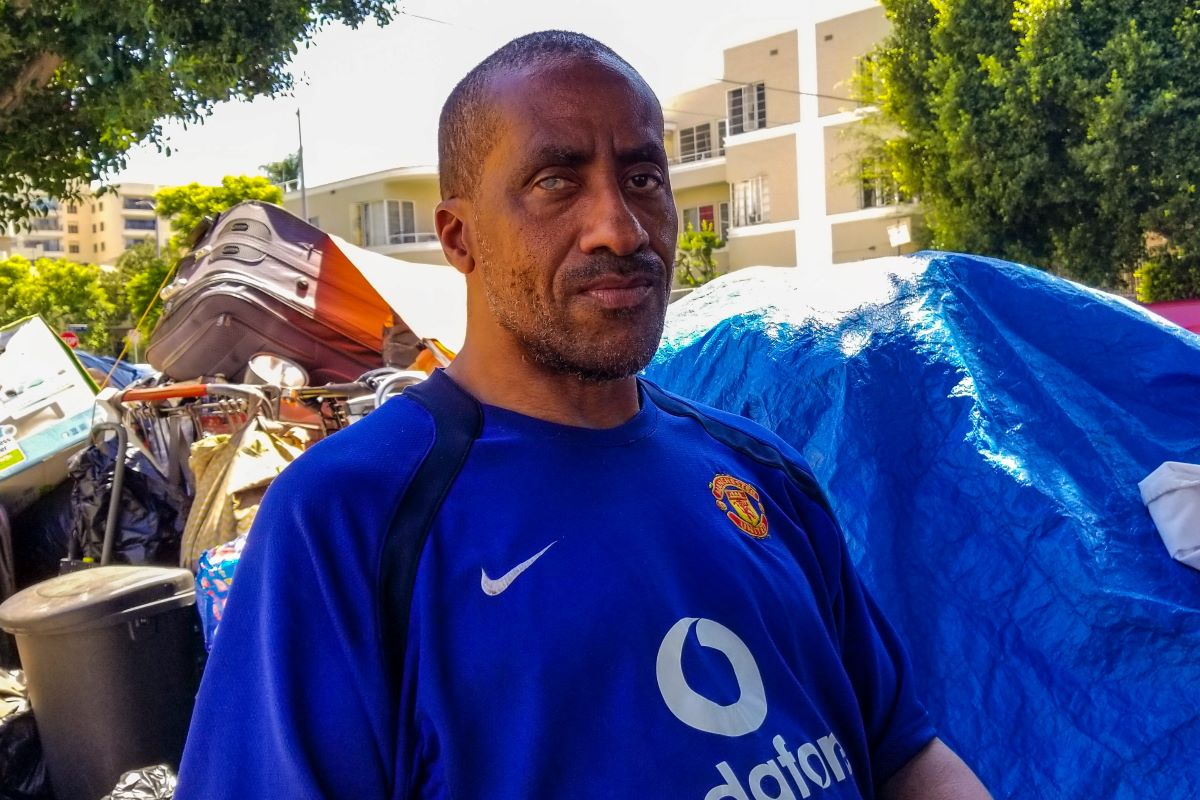
Shawn Pleasants
Jane Nguyen of K-Town For All introduces me to 52-year-old Shawn Pleasants.
When Shawn was born, he was told “at best he would walk with a limp” but he beat the odds, eventually becoming a marathon runner. Shawn has always embraced being the underdog. Despite being a late bloomer academically, he graduated valedictorian of his high school class. He turned down Harvard, graduated from Yale and worked on Wall Street. When he moved to Los Angeles, he worked for Merrill Lynch and other well-known financial firms. But years later, Shawn fell into homelessness. Now he lives a block away from Harvard Blvd in Koreatown.
“For me it was several things occurring at the same time.”
Shawn became homeless after owning a business for seven years. In 2008, he was living in a house that he owned in Silverlake when a partnership disagreement led to his business folding. After that, Shawn was “running on fumes,” struggling to pay the $1,800 in monthly rent that he used to be able to pay in full for the year upfront. Around the same time, Shawn’s mom was diagnosed with colon cancer and passed away suddenly. Shawn fell apart. “That was kinda the big crushing blow. I ended up just trying to walk back to Texas. I was that distraught.”
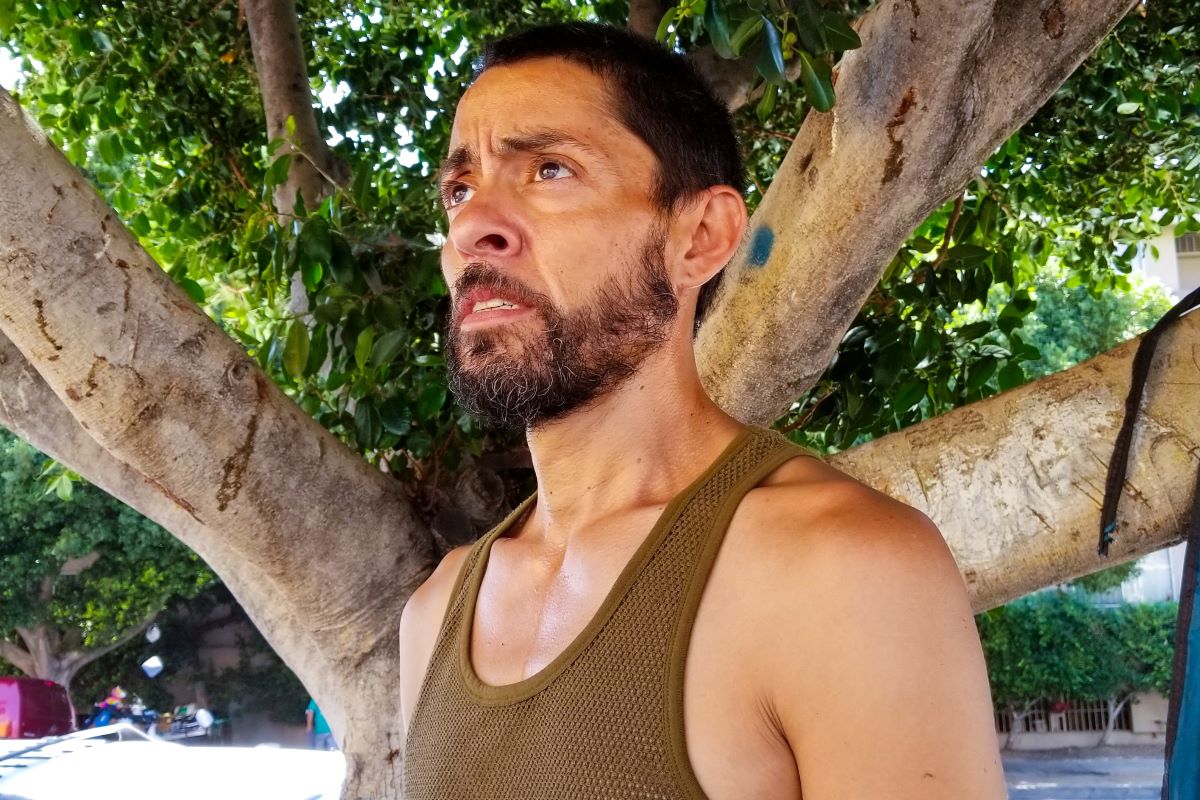
David, Shawn’s roommate
Shawn’s roommate, David, and his landlord were able to talk some sense into him. But the pair still had to move out of their place in Silverlake. After leaving, they lived with friends and couch surfed for a while before moving into their car and then being pushed onto the streets. When they landed on the pavement, they settled in the densely populated, centrally located neighborhood because David had a friend living nearby at Manhattan and 7th. Shawn and David traded showers in exchange for chauffeuring the friend around and helping him get up for meetings.
Your First Sweep Is the Worst
Currently, Shawn and David live at 7th and Hobart, the corner they’ve called home for half a decade now.
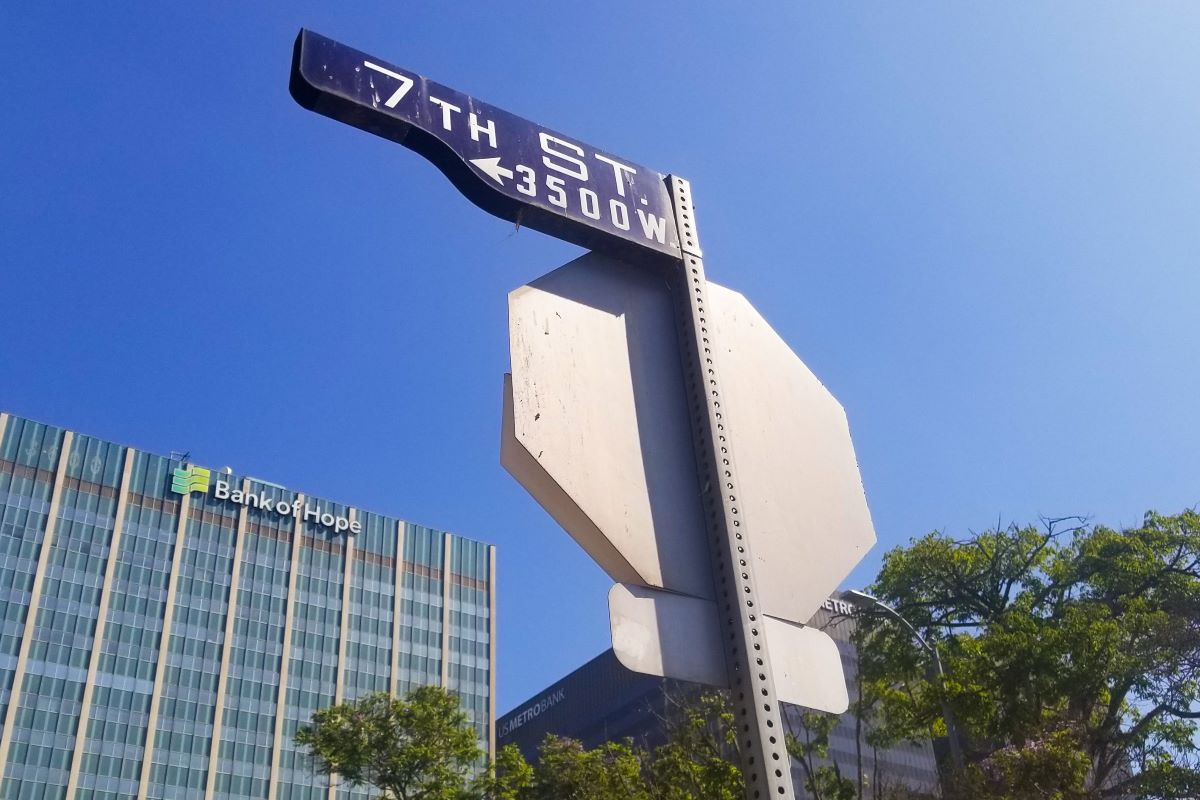
Shawn explains that it’s rare for a homeless person to occupy the same turf for so long. “People here move every time they get shuffled by sanitation and they don’t usually come back. They just keep drifting around. But that’s not the way we are.”
Shawn explains that he and David have gotten to know their housed neighbors and the other long-term members of the encampment. Staying together creates a sense of community. “It’s nice having that continuity and structure. These are the people we know.”
Shawn talks about how sanitation sweeps have affected him over the years. “The most devastating is the first time,” he tells me.
The first sweep is usually when people lose the things that they can’t replace like important documentation, family photos or something as basic as a person’s favorite piece of clothing.
“Those were the few things that just knowing you had them gave you strength to go on for the day. All of that goes away.”
Shawn describes what the “first time” felt like for him, “you can’t breathe, you start seeing red, you start getting dizzy, things are spinning. You try to scream but there’s no one to scream at. And you just can’t believe that someone took everything that represents your existence in this world and threw it away.”
The Sweep Gets Underway on a Hot August Morning
Four LAPD officers and about a dozen sanitation employees section off the corner of Admore and 6th in Koreatown to conduct a sanitation clean. The cleaning was supposed to start as early as 8:30am but didn’t get going until closer to 10am, Chris, an attorney with Public Counsel and a member of K-Town For All tells me. Chris is there documenting and monitoring the sweep.
“As a homeless person you lose rights” said 36-year-old Muhammad, a long-term resident of Los Angeles by way of the East Bay. Muhammad placed his belongings neatly in a parking spot on the street to try and protect his stuff. The notice that sanitation posted only listed sidewalks and alleyways as areas that were subject to cleaning. But that doesn’t seem to matter.
Like most homeless people in LA County, Muhammad has lived in L.A. for over 10 years. He moved to San Fernando Valley over 26 years ago. Like a lot of people that grow up in this city, he moved around a lot as a kid and young adult. Muhammad currently lives at 6th and Ardmore.
Muhammad, Chris and I watch from across the street as a few sanitation employees rummage through Muhammad’s belongings. The rest station themselves in the shade. Some of the sanitation workers sit on the sidewalk and use their phones while the LAPD officers joke and laugh periodically.
Muhammad grows more frustrated as his neatly organized belongings are tossed around, disassembled and eventually discarded. He makes light of the situation by telling jokes and taking little verbal jabs at the sanitation workers. But he grows angrier as they seemingly taunt him back by being increasingly more careless with his belongings.
Seized Belongings Like Muhammad’s Are Often Destroyed
Tensions escalate as sanitation workers begin to throw Muhammad’s belongings into the trash compactor. Several bike frames, wheels, tires, vintage cameras, antiques, recycling that could have been cashed in for money to buy food and other goods that Muhammad planned to sell are all destroyed. Scattered belongings are shoveled into a rug, folded up and tossed into the trash compactor.
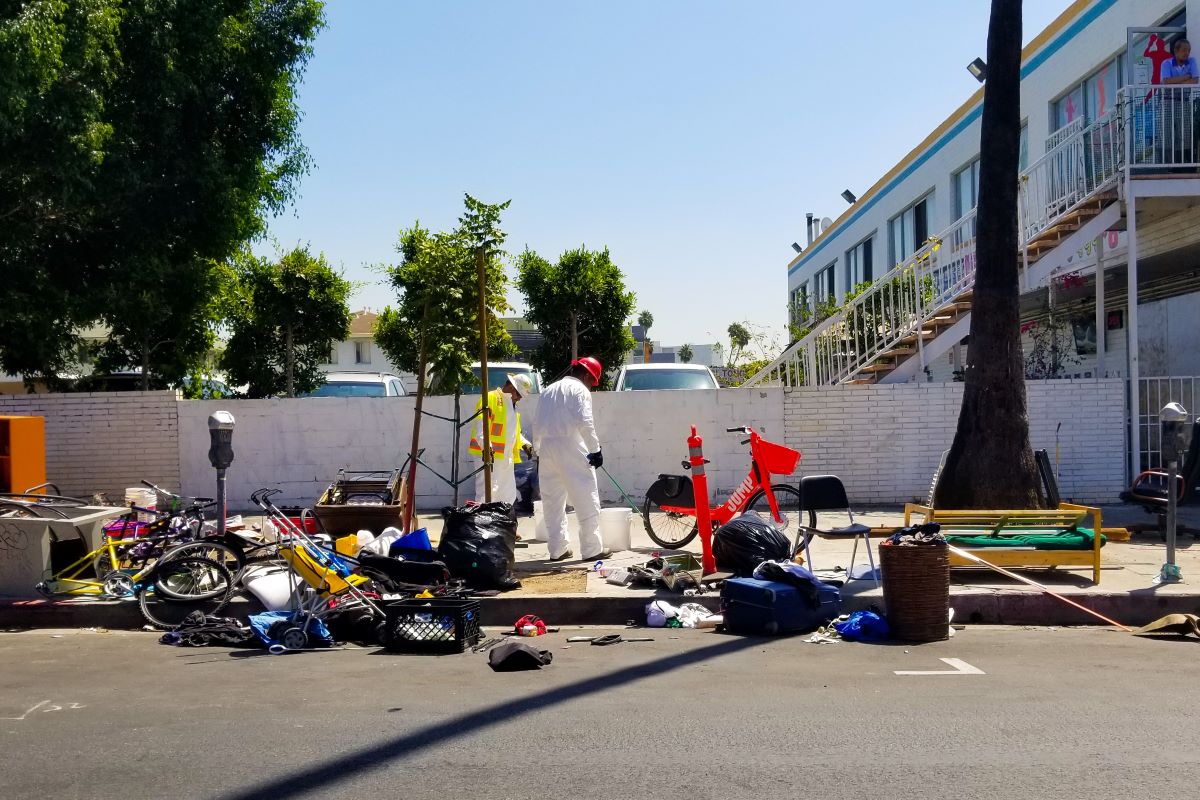
Sanitation workers sorting through Muhammad’s stuff
What remains of his belongings is stuffed into two large trash bags and loaded into a black Lincoln Navigator. Theoretically, Muhammad should be able to track down the contents in the garbage bags. But according to the lawsuit, the vast majority of belongings seized by sanitation are ultimately destroyed for various reasons.
After pleading with LAPD officers, a supervisor is called and one of Muhammad’s bike frames and two wheels is saved from the garbage truck. He’s told that he’s only allowed to have one bike frame if it’s assembled. Disassembled bikes are considered trash. Muhammad tells me that he disassembles his bike so it doesn’t get stolen. Among the more notable things lost is a vintage film camera. It is dumped onto the sidewalk before being destroyed. Muhammad lets me know he’s a film enthusiast and street shooter when he notices I’m carrying around a 35mm camera.
After two hours of going through Muhammad’s stuff, the crew finally moves onto the trash on the sidewalk. Within a half hour they’re finished. An LAPD officer walks up to Muhammed and hands him a card with his information on it. “I did what I could,” he tells Muhammed, hanging his head as he walks back to his squad car. The crew packs up and leaves.
By the end of the sweep, Muhammad is reduced to tears, albeit only a few.
All he has left is a small backpack’s worth of belongings. Despite losing almost all his stuff in a couple hours, Muhammad quickly regains his cool demeanor. I tell him I’m sorry. He tells me, “I’m sorry for them.”
We get back to talking about cameras. “I didn’t let them take my good camera though,” he tells me. Muhammed fishes into his backpack and retrieves a black vintage Voigtlander rangefinder. I lift the camera up to my eye. Muhammad smiles again as we get into a conversation about German engineering and street photography.







